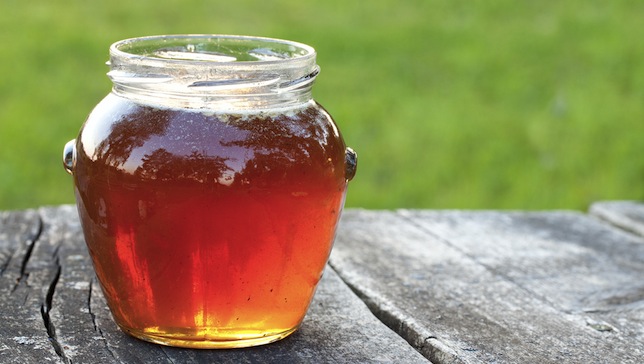Honey has long been known by many cultures to have a wide range of health benefits in adults.
Contents
Uses
Among the topical uses for honey are:
- Acne: Honey is naturally antibacterial, so it’s great for acne treatment and prevention.
- Aging: Full of antioxidants, it is great for slowing down aging.
- Complexion boost: It is extremely moisturizing and soothing, so it helps create a glow.
- Pores: Honey is clarifying because it opens up pores making them easy to unclog.
- Anti-Bacterial: In numerous studies, honey has been found effective in treating wounds.
Benefits
- Acid reflux: Professor Mahantayya V Math, from MGM Medical College, Kamothe, Navi Mumbai, India, explained in the BMJ (British Medical Journal) that, as it is 125.9 more viscous than distilled water at 37 celsius (body temperature), honey may be helpful in preventing GERD (Gastroesophageal reflux).
- Prevent cancer and heart disease: Honey contains flavonoids, antioxidants which help reduce the risk of some cancers and heart disease.
- Reduce ulcers and other gastrointestinal disorders: Recent research shows that honey treatment may help disorders such as ulcers and bacterial gastroenteritis. This may be related to the 3rd benefit…
- Anti-bacterial, anti-fungal: “All honey is antibacterial, because the bees add an enzyme that makes hydrogen peroxide,” said Peter Molan, director of the Honey Research Unit at the University of Waikato in New Zealand.
- Increase athletic performance: Ancient Olympic athletes would eat honey and dried figs to enhance their performance. This has now been verified with modern studies, showing that it is superior in maintaining glycogen levels and improving recovery time, than other sweeteners.
- Reduce cough and throat irritation: Honey helps with coughs, particularly buckwheat honey. In a study of 110 children, a single dose of buckwheat honey was just as effective as a single dose of dextromethorphan in relieving nocturnal cough and allowing proper sleep.
Cautions
- The National Institutes of Health report you should never consume raw honey in order to prevent food poisoning, particularly if you are already immunocompromised.
- It’s especially dangerous to give raw honey to infants under the age of one. According to MayoClinic.com, giving raw honey to infants may cause infant botulism, a rare but serious gastrointestinal sickness caused by exposure to bacterial spores. Infant botulism can be life-threatening.
- Honey is natural and considered harmless for adults. But pediatricians strongly caution against feeding honey to children under 1 year old.
References
- Source: WeMD, www.webmd.com/diet/features/medicinal-uses-of-honey
- Source: Herrington, Diana; “10 Health Benefits of Honey”, August 22, 2012; www.care2.com/greenliving/10-health-benefits-of-honey.html
- Source: MayoClinic.com

